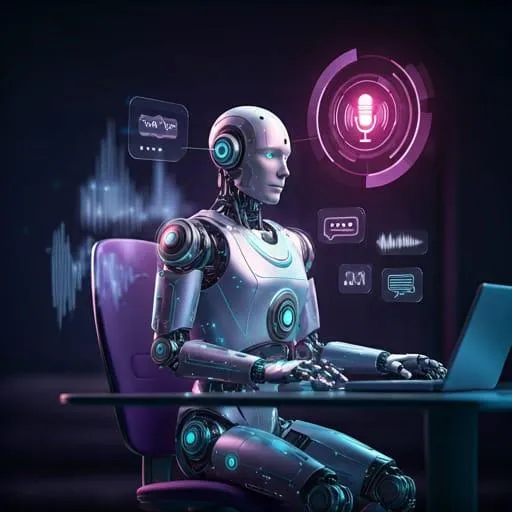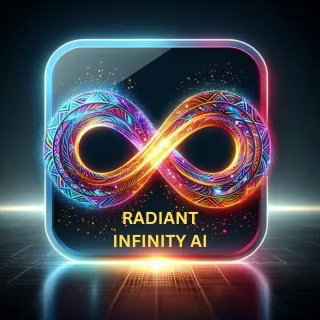"Empowering Businesses Through Intelligent Automation"
We enable businesses to harness the power of AI and automation to streamline operations, improve efficiency, and drive growth. Our intelligent solutions empower industries to innovate and stay ahead in a competitive digital landscape.
Large Call to Action Headline
Who We Are
Radiant Infinity AI is a forward-thinking automation agency specializing in AI-driven solutions to revolutionize business operations. We empower industries with smart AI solutions to enhance efficiency, innovation, and customer experiences.
Our Story
Radiant Infinity AI was born out of a vision to harness the transformative power of artificial intelligence and automation to simplify and revolutionize business operations. As industries faced increasing challenges in efficiency, scalability, and customer engagement, we recognized the potential of AI to bridge these gaps seamlessly. With a dedicated team of innovators and AI experts, we set out to create tailored, cutting-edge solutions that empower businesses to stay ahead in the digital age.
From designing intelligent chatbots and voice bots to building end-to-end automation systems, our journey has been fueled by a passion for helping clients achieve more with less effort. We take pride in blending futuristic technology with user-friendly designs, making AI accessible and impactful for businesses of all sizes. Radiant Infinity AI isn't just a service provider; we are a trusted partner committed to driving sustainable growth and innovation.
Our story is one of continuous evolution, fuelled by a desire to push boundaries and deliver excellence. As we look ahead, our mission remains clear: to empower businesses worldwide with intelligent automation, transforming challenges into opportunities for success.
Our Service
we offer intelligent automation solutions like AI-driven chatbots, voice bots, Ai agents and workflow automation to streamline business processes. Our services empower businesses to enhance efficiency, improve customer experiences, and drive growth through cutting-edge AI technologies.

Chatbots
Our Radiant Infinity AI powered chatbots are designed to deliver seamless, intelligent customer interactions. They enhance efficiency by automating responses, personalizing conversations, and providing 24/7 support for businesses...

Voice Bots
Our Radiant Infinity AI driven voice bots offer natural, conversational interactions, enabling businesses to provide efficient, hands-free support. They streamline processes with intelligent voice automation, enhancing customer experiences effortlessly.

AI Virtual Receptionist
Our Radiant Infinity AI-powered Virtual Receptionist combine natural language processing with advanced automation to handle complex customer interactions. They deliver accurate, human-like responses, transforming how businesses communicate and support clients.

AI Automation Agents
Our Radiant Infinity AI Automation agents improve business processes by streamlining routine tasks, enhancing efficiency, and reducing errors. It ensures consistent and accurate task execution by implementing predefined rules, allowing teams to focus on strategic initiatives.
Our Recent Projects
CHATBOTS creation
VOICEBOTS Creation
AI Agents
AI Virtual Receptionist
AI Automation Agent
Workflow Automation
Social Media Marketing
Radiant Infinity AI revolutionizes social media marketing with intelligent automation and personalized strategies. Our AI-driven tools optimize content creation, target the right audience, and enhance engagement effortlessly. We help businesses run data-driven campaigns, boosting ROI while saving time and resources. By analyzing trends and user behavior, we craft impactful, result-oriented marketing plans. With Radiant Infinity AI, elevate your brand's social media presence and drive measurable growth.
Service Management
Service management ensures seamless delivery of services to meet client needs effectively and efficiently. It involves planning, designing, delivering, and monitoring processes to enhance customer satisfaction. By leveraging tools and automation, it streamlines workflows, reduces operational costs, and improves service quality. Effective service management aligns business goals with customer expectations for long-term success. It is a cornerstone for fostering trust, loyalty, and continuous improvement in any organization.

An Automation agency that helps you succeed
Our automation agency empowers businesses with cutting-edge AI solutions to streamline operations and drive success. We specialize in automating repetitive tasks, enhancing productivity, and improving customer experiences. By leveraging intelligent tools like chatbots, voicebots, and workflow automation, we unlock new growth opportunities for your business. Our tailored solutions ensure seamless integration, scalability, and measurable results. Partner with us to revolutionize your processes and achieve unparalleled success in today's competitive market.
OUR TEAM

Sarvani Vidyadharani – Founder, Technical Director
Sarvani Vidyadharani leads the technology strategy at Radiant Infinity AI, ensuring innovation, security, and a seamless user experience align with business growth. With a deep passion for automation and AI-driven solutions, she focuses on developing cutting-edge systems that streamline operations and maximize efficiency. Her expertise in leveraging advanced technologies helps businesses scale effortlessly while maintaining security and reliability.
Under her leadership, Radiant Infinity AI delivers high-impact automation solutions tailored for entrepreneurs and enterprises. She ensures that every solution is user-friendly, future-ready, and designed for optimal performance. With a commitment to continuous innovation, Sarvani drives the agency’s mission to make automation accessible, efficient, and profitable for all clients.

Tarun Kumar– Technical Analyst
Tarun Kumar specializes in optimizing AI-driven automation solutions for seamless business operations. With expertise in data analysis, system integration, and emerging technologies, he ensures efficiency, security, and scalability in every solution.
Tarun identifies inefficiencies, analyzes performance metrics, and enhances workflows to maximize productivity. His problem-solving skills and strategic insights drive innovation, helping businesses transition smoothly to AI-powered automation.
Committed to staying ahead of industry trends, he ensures Radiant Infinity AI delivers cutting-edge, future-ready solutions. His expertise empowers businesses to save time, reduce costs, and achieve sustainable growth with smart automation strategies.
Frequently Asked Question
Chatbots
1. What is a chatbot, and how does it work?
A. Chatbot is a software application designed to simulate human conversation. It works by interpreting user inputs and responding with pre-programmed messages or AI-generated replies.
2. What types of chatbots are available (rule-based vs. AI-powered)?
A. Rule-based chatbots follow set scripts and predefined rules, while AI-powered chatbots use machine learning and NLP to understand and respond dynamically to user inputs.
3. How can chatbots improve customer service?
A. Chatbots provide instant responses, 24/7 availability, and efficient resolution for common queries, reducing response times and improving customer satisfaction.
4. What industries benefit most from using chatbots?
A. Industries like e-commerce, healthcare, banking, education, hospitality, and real estate benefit significantly by streamlining operations and enhancing customer interactions.
5. Can chatbots handle multiple languages?
A. Yes, many chatbots support multiple languages using advanced NLP algorithms, making them versatile for global audiences.
6.Are chatbots capable of understanding complex queries?
A. AI-powered chatbots with NLP can understand and process complex queries, though their performance may vary depending on training and data quality.
7. How do chatbots integrate with existing platforms like websites or apps?
A. Chatbots can be embedded using APIs or software development kits (SDKs) to integrate seamlessly with websites, apps, or social media platforms.
8. What is the difference between a chatbot and a virtual assistant?
A. Chatbots are typically task-specific and focus on predefined functions, while virtual assistants like Alexa or Siri perform a wider range of tasks and provide contextual assistance.
9. How do chatbots use natural language processing (NLP)?
A. NLP allows chatbots to interpret, understand, and respond to human language by analyzing syntax, semantics, and context.
10. What is the cost of developing and maintaining a chatbot?
A. Costs vary widely depending on the complexity, ranging from free or low-cost DIY platforms to $10,000+ for custom AI-powered solutions.
11.Can chatbots handle sensitive customer information securely?
A. Yes, if designed with robust security measures like encryption and compliance with data protection regulations (e.g., GDPR, HIPAA).
12. What are the limitations of chatbots?
A. Chatbots may struggle with highly complex or ambiguous queries and require human intervention for nuanced or emotional responses.
13. How do chatbots learn and improve over time?
A. AI chatbots use machine learning to analyze user interactions and feedback, refining their algorithms for better performance.
14. What is the role of artificial intelligence in chatbot functionality?
A. AI enables chatbots to learn, understand natural language, and provide personalized and context-aware responses.
15. How do chatbots measure and improve customer satisfaction?
A. Chatbots gather user feedback, monitor sentiment, and track metrics like resolution rate and response time to identify improvement areas.
16. What are the key features to look for in a chatbot platform?
A. Important features include NLP, integration capabilities, analytics, multi-language support, and scalability.
17. Can chatbots escalate conversations to human agents when needed?
A. Yes, most chatbots are programmed to transfer conversations to live agents when queries exceed their capabilities.
18. How can chatbots be used for marketing and lead generation?
A. Chatbots engage users through personalized messages, guide them through product offerings, and collect valuable lead data.
19. What metrics should be tracked to measure a chatbot's performance?
A. Key metrics include user engagement, resolution rate, response time, customer satisfaction (CSAT), and conversation drop-off rates.
20.What future trends can we expect in chatbot technology?
A. Future trends include greater personalization, integration with IoT devices, advanced conversational AI, and proactive customer engagement capabilities.

Voice Bots
1.What is a voicebot, and how does it work?
A. A voicebot is an AI-powered application that uses voice recognition technology to interact with users through spoken language. It processes voice inputs, understands the intent, and responds with synthesized speech.
2. How are voicebots different from chatbots?
A. Voicebots interact using spoken language, while chatbots rely on text-based communication. Voicebots use speech-to-text (STT) and text-to-speech (TTS) technology for their functionality.
3.What industries can benefit from voicebots?
A. Industries like healthcare, banking, retail, customer support, education, and transportation benefit from voicebots for enhancing user convenience and automating processes.
4. Can voicebots handle multiple languages?
A. Yes, many voicebots are multilingual, capable of understanding and responding in multiple languages based on the user’s preference.
5. How do voicebots use natural language processing (NLP)?
A. NLP helps voicebots interpret, understand, and generate spoken responses by analyzing speech patterns, context, and intent.
6. What are the key use cases of voicebots?
A. Common use cases include virtual customer support, appointment scheduling, voice shopping, hands-free device control, and automated surveys.
7. How do voicebots handle accents and dialects?
A. Advanced voicebots use machine learning models trained on diverse speech data to recognize various accents and dialects.
8. Are voicebots secure for handling sensitive information?
A. Yes, voicebots can be designed with strong encryption, authentication protocols, and compliance with privacy regulations to handle sensitive data securely.
9.Can voicebots integrate with existing business systems?
A. Yes, voicebots can integrate with CRM systems, ERPs, cloud platforms, and other business applications using APIs.
10.What is the role of artificial intelligence in voicebot functionality?
A. AI powers voicebots by enabling them to learn, understand user intent, process complex queries, and deliver human-like conversations.
11. How can voicebots improve customer experience?
A. Voicebots provide faster, hands-free support, 24/7 availability, and personalized assistance, making interactions smoother and more efficient.
12. Do voicebots require internet connectivity to function?
A. Most voicebots require internet connectivity to process voice data through cloud-based AI models. Offline functionality is possible but limited.
13. What is the cost of developing and deploying a voicebot?
A. Costs vary depending on complexity, starting from a few thousand dollars for basic models to tens of thousands for custom enterprise-level solutions.
14. Can voicebots transfer conversations to human agents?
A. Yes, voicebots can seamlessly escalate calls to human agents when they encounter complex or unresolved queries.
15. How do voicebots improve productivity in organizations?
A. Voicebots automate repetitive tasks, reduce human workloads, and enable faster resolution of customer issues, enhancing overall productivity.
16. What are the challenges in implementing voicebots?
A. Challenges include ensuring accuracy in voice recognition, handling diverse languages and accents, and integrating with existing systems.
17.Can voicebots be used for marketing and sales?
A. Yes, voicebots can engage users with personalized offers, guide them through product choices, and support voice-based e-commerce.
18. How do voicebots measure performance?
A. Performance metrics include accuracy, conversation completion rate, user satisfaction (CSAT), and first-call resolution rate.
19. What are the advantages of voicebots over traditional IVR systems?
A. Voicebots provide natural, conversational interactions, understand complex queries, and offer more personalized responses than rigid IVR systems.
20. What future trends can we expect in voicebot technology?
A. Future trends include greater contextual understanding, integration with IoT devices, emotion detection, and predictive voice interactions.

AI Agents
1. What is an AI agent?
A. An AI agent is an intelligent system designed to perform specific tasks autonomously or semi-autonomously. It uses algorithms, machine learning, and natural language processing to interact with users and carry out tasks.
2. How does an AI agent work?
A. AI agents process input from users or the environment, make decisions based on that data, and perform actions to achieve a predefined goal, improving with experience over time through learning.
3. What are the key types of AI agents?
A .Types of AI agents include reactive agents, goal-oriented agents, and learning agents, each designed for different levels of complexity and interactivity.
4. What is the difference between an AI agent and a chatbot?
A. While both are powered by AI, an AI agent is more complex, capable of handling multiple tasks, learning, and making decisions autonomously, whereas chatbots focus mainly on conversations.
5. Can AI agents learn from past interactions?
A. Yes, AI agents use machine learning and reinforcement learning to improve their decision-making abilities based on past experiences and interactions.
6. How are AI agents used in business?
A. AI agents are used in customer support, sales automation, data analysis, fraud detection, and process automation, enhancing efficiency and reducing human workload.
7. What industries benefit the most from AI agents?
A. AI agents benefit various industries, including customer service, healthcare, retail, finance, logistics, and technology, by automating tasks, improving efficiency, and enhancing customer experiences.
8. How do AI agents handle complex queries?
A. AI agents process complex queries by analyzing input using advanced algorithms and NLP, extracting meaning, and making decisions or referring to external resources for detailed answers.
9. Are AI agents secure for handling sensitive data?
A. Yes, AI agents can be equipped with encryption, authentication, and data protection mechanisms to ensure the security of sensitive information.
10. What is the role of natural language processing (NLP) in AI agents?
A. NLP helps AI agents understand, process, and generate human language, enabling them to communicate effectively and interpret complex instructions in real-time.
11. Can AI agents be customized for specific tasks?
A. Yes, AI agents can be customized to perform specific tasks such as scheduling, data entry, customer interaction, or complex decision-making processes.
12. How do AI agents improve customer experience?
A. AI agents provide faster, more accurate responses, personalized interactions, and 24/7 availability, leading to improved customer satisfaction and engagement.
13.What is the difference between AI agents and virtual assistants?
A. Virtual assistants like Siri or Alexa are specialized types of AI agents that focus on tasks such as managing calendars and providing information. AI agents can perform a broader range of tasks, including complex decision-making.
14.Can AI agents be used for process automation?
A. Yes, AI agents can automate business processes by managing workflows, handling repetitive tasks, and making data-driven decisions without human intervention.
15. What technologies power AI agents?
A. AI agents are powered by machine learning algorithms, deep learning, reinforcement learning, NLP, and sometimes computer vision, allowing them to understand and respond to a variety of inputs.
16. How do AI agents improve productivity?
A. By automating routine tasks, providing quick responses, reducing errors, and supporting decision-making, AI agents free up human resources for more strategic work.
17. Can AI agents work in real-time?
A. Yes, AI agents are capable of operating in real-time, providing immediate responses to users or system inputs, which is critical for applications like customer service or live data analysis.
18. What are the challenges in deploying AI agents?
A. Challenges include ensuring accurate data collection, maintaining user trust, handling unforeseen scenarios, and managing integration with existing systems.
19. Can AI agents be integrated with other business systems?
A. Yes, AI agents can be integrated with CRMs, ERPs, helpdesks, and other business systems using APIs, enabling seamless automation and workflow management.
20. What are the future trends for AI agents?
A. Future trends include AI agents becoming more conversational, intuitive, and context-aware, with increased capabilities in personalization, predictive analytics, and emotion detection.

Workflow Automation
1.What is workflow automation?
A. Workflow automation is the process of using technology to streamline and automate repetitive tasks and processes, reducing manual intervention and increasing efficiency.
2. How does workflow automation work?
A. It works by defining specific rules and steps in a process, and then software tools execute those steps automatically when the required conditions are met.
3. What are the key benefits of workflow automation?
A. Benefits include improved efficiency, reduced errors, faster task completion, better resource management, and enhanced employee productivity.
4.What types of tasks can be automated?
A. Tasks such as approvals, data entry, report generation, notifications, scheduling, and document sharing are commonly automated.
5.What industries can benefit from workflow automation?
A. Industries like healthcare, finance, retail, manufacturing, education, and IT benefit significantly from workflow automation.
6. How do I identify processes suitable for automation?
A. Look for repetitive, time-consuming, and rule-based tasks that don’t require much human judgment or creativity.
7. What tools are used for workflow automation?
A. Tools like Zapier, Microsoft Power Automate, UiPath, Nintex, and Automation Anywhere are popular workflow automation platforms.
8. Is workflow automation expensive?
A. Costs vary based on the complexity of the workflow and the chosen platform, but many tools offer affordable pricing plans for small to medium-sized businesses.
9. Can workflow automation integrate with existing software?
A. Yes, most automation platforms provide APIs or built-in connectors to integrate with CRMs, ERPs, and other business applications.
10. How secure is workflow automation?
A. Workflow automation systems often include security features like encryption, access control, and audit logs to ensure data protection and compliance.
11. Can workflow automation improve team collaboration?
A. Yes, it enhances collaboration by keeping teams informed with automated updates, reducing miscommunication, and centralizing task management.
12. What is the difference between workflow automation and robotic process automation (RPA)?
A. Workflow automation focuses on automating processes, while RPA involves using bots to mimic human actions for repetitive tasks like data entry.
13. How can workflow automation improve customer experience?
A. It speeds up processes like ticket resolution, order management, and customer onboarding, ensuring timely and accurate responses to customers.
14. Is coding required to implement workflow automation?
A. No, many workflow automation tools are no-code or low-code, making them accessible to users without technical expertise.
15. How do I measure the success of workflow automation?
A. Metrics such as time saved, error reduction, cost efficiency, and user satisfaction are key indicators of successful automation.
16. Can workflow automation adapt to changes in processes?
A. Yes, most tools allow for easy modifications to workflows, ensuring they can evolve with your business needs.
17. What are the common challenges in implementing workflow automation?
A. Challenges include lack of clear objectives, resistance to change, data quality issues, and integration difficulties with legacy systems.
18. How long does it take to implement workflow automation?
A. Implementation times vary, but simple workflows can be automated in a few hours, while complex systems might take weeks or months.
19. What compliance issues should I consider with workflow automation?
A. Ensure your workflows align with industry regulations like GDPR, HIPAA, or PCI DSS, especially when handling sensitive data.
20. What is the future of workflow automation?
A. Future trends include AI-driven decision-making, hyper-automation (integrating multiple tools), and more intuitive, user-friendly platforms. These FAQs and answers provide a solid foundation for understanding and explaining workflow automation!

Address and Mail
Address
Office: RADIANT INFINITY AI, HYDERABAD, TELANGANA, INDIA
Get In Touch
Assistance Hours
Monday to Saturday:- 9:00am – 6:00pm
Phone Number:
919703610404(WhatsApp)
